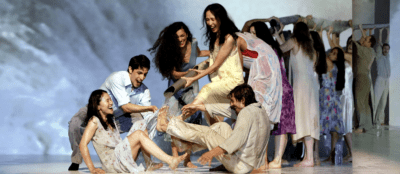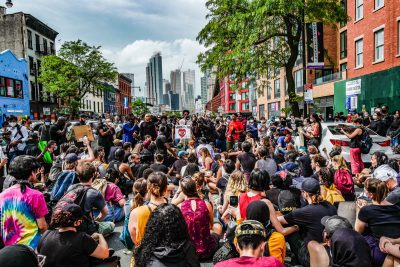In ‘Beautiful Country,’ a look back at growing up an undocumented Chinese girl in New York
Qian Julie Wang joins 'Brooklyn Magazine: The Podcast' to discuss her affecting—and healing—best-selling memoir
Like what you’re hearing? Subscribe to us at iTunes, check us out on Spotify and hear us on Google, Amazon, Stitcher and TuneIn. This is our RSS feed. Tell a friend!
All of our stories start well before we were born, and Qian Julie Wang’s is no exception. Her new memoir, “Beautiful Country,” begins with events during China’s Cultural Revolution that will influence the entirety of her life.
When Wang’s uncle was 18, he was arrested for criticizing Mao Zedong, casting the rest of her family under his oppressive regime’s long shadow. In 1994, at just 7, Wang moved to New York with her mother to join her father, an English professor who had fled here two years earlier. They were undocumented, though, and for the next several years were forced to live in a different kind of shadow—in the the underground world of undocumented immigrants who are forced to work menial jobs and live in fear of being discovered.
“Very early in our time in the United States, I as a child started wondering why we were here at all because it seemed far worse day to day than what we were dealing with in China,” says Wang, who is this week’s guest on “Brooklyn Magazine: The Podcast.” “My mother went on to do a series of pretty physically damaging and emotionally scarring jobs, the worst of which was working at a sushi processing plant in Lower Manhattan where she essentially stood in ice water for her entire 14 hour shift.”
Wang became a citizen in 2016, 22 years after first arriving in New York without knowing a word of English. A Yale Law graduate and managing partner of her own firm, Gottlieb & Wang LLP, she lives in Brooklyn Heights with her husband. “Beautiful Country” came out in September and tells the story of her first years in America through the eyes of a child struggling to process the upheaval of everything that had been familiar to her. It instantly landed on the New York Times Bestseller list. But more importantly to Wang, the process of writing the book was, for her, a way to confront years of isolation and fear.
“I really wanted to reclaim my childhood, my past, and reclaim myself from the shame that I had grown up with for so long, and in doing so take away some of the stigma that is associated with being a new immigrant, being an undocumented immigrant, being an Asian American and show a little bit of the beating heart and strength and resilience behind the headlines and the political talking points,” she says.
The book is a spare and moving retelling of her arrival in America—the titular “Beautiful Country”—where as an impoverished undocumented girl she was never allowed or able to be her full self. And in telling her personal story, she reveals a side of the American Dream familiar to so many immigrants as more of a series of traumas. In her case there is a happy, or at least healing ending.
“For the first time it feels like [my family is] free to build new future chapters that are untethered from that past that we never talked about,” she says. “So often I think we’re asked to choose between those polarities, especially: ‘are you immigrant or American? Are you Chinese or are you whitewashed?’ And I really want to show to others as well as to myself that it’s possible to be both-and and not either-or.”
Check out this episode of “Brooklyn Magazine: The Podcast” for more. Subscribe and listen wherever you get your podcasts.
You might also like 


























